Trump excludes phones and computers from his reciprocal tariffs
This decision might benefit tech companies such as Apple that were confronting the possibility of rising prices.

A guidance released by the U.S. Customs and Border Protection late Friday specified that these consumer electronics—many produced in China—would not be affected by Trump’s ongoing tariff escalations with China or the 10 percent global tariff. Additionally, machines used in semiconductor manufacturing will also enjoy an exemption.
Despite this, Trump has indicated he may impose sector-specific tariffs on certain goods, including semiconductors, which are crucial for a range of electronics.
This development may benefit technology companies like Apple, which were bracing for increased manufacturing costs due to the tariffs. The exemptions come as major tech firms from Silicon Valley have sought closer ties with Trump’s administration.
The decision to remove tariffs on electronics marks a shift for the administration, especially after White House press secretary Karoline Leavitt remarked earlier this week that companies like Apple should move their manufacturing to the U.S.—an undertaking that could take years.
"We have the labor, workforce and the resources to do it," Leavitt stated Tuesday.
On Saturday, Leavitt reiterated Trump’s objective to promote manufacturing in the United States but did not explain the timing of the tariff exemption.
“President Trump has made it clear America cannot rely on China to manufacture critical technologies such as semiconductors, chips, smartphones, and laptops,” Leavitt said. “That’s why the President has secured trillions of dollars in U.S. investments from the largest tech companies in the world, including Apple, TSMC, and Nvidia. At the direction of the President, these companies are hustling to onshore their manufacturing in the United States as soon as possible.”
However, this decision has sparked debate among consumers. GameStop CEO Ryan Cohen, a notable supporter of Trump, criticized the tariffs on social media, expressing his frustration about the prospect of a $10,000 iPhone made in the U.S.
The announcement of Trump’s global trade war on "Liberation Day," April 2, sent shockwaves worldwide as numerous countries, from China to Canada, quickly retaliated with their own tariffs, prompting criticism of the administration as Trump urged other nations to “BE COOL” about the situation.
The stock markets plunged following the announcement, significantly impacting the tech sector, with Apple losing $640 billion in market value within the week. Various countries have since sought discussions with the administration to potentially mitigate the effects of the sweeping tariffs.
In a surprising turn on Wednesday, Trump announced a 90-day suspension of the tariffs for all countries except China and retained a 10 percent baseline tariff to take effect in the interim. The pause did not extend to China, which continued to face rising duty rates amid ongoing retaliation.
Trump hinted at potential exemptions while aboard Air Force One on Friday, telling reporters that there could be exemptions "for obvious reasons" while maintaining the 10 percent baseline tariff.
Previously, he had mentioned that some sectors might face greater tariff impacts than others and expressed readiness to show “flexibility.” If his administration decides to implement sectoral tariffs on technologies like semiconductors, these rates would likely be lower than the current tariff on China.
"Some companies, through no fault of their own, they happen to be in an industry that is more affected by these things than others,” Trump said Wednesday. “You have to be able to show a little flexibility, and I'm able to do that.”
Democratic responses to the exemption for electronics have criticized the administration for what they perceive as inconsistency in its tariff strategy. Some have noted the significant donation Apple CEO Tim Cook made to Trump’s inauguration.
“So while working families pay more, Apple gets special treatment,” Rep. Greg Casar wrote on X.
Sen. Chris Murphy condemned the tariffs, alleging they serve as "a regime to reward big businesses like Apple that can make giant contributions to Trump."
“I told you that companies or industries were going to come on bended knee to Trump to ask for relief and exemptions. And of course Trump will ask for loyalty in return,” Murphy wrote on X.
Frederick R Cook for TROIB News
Discover more Science and Technology news updates in TROIB Sci-Tech












